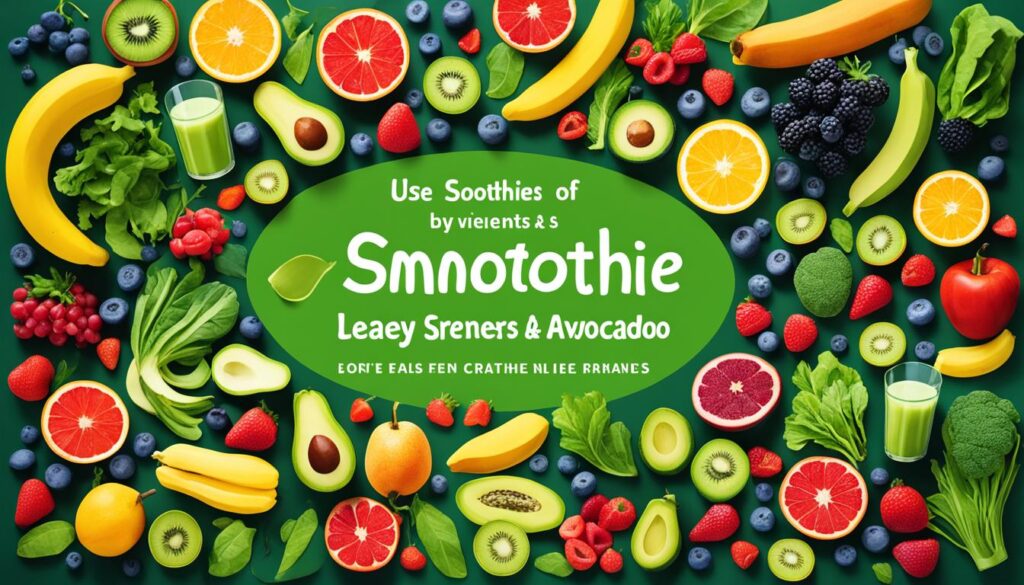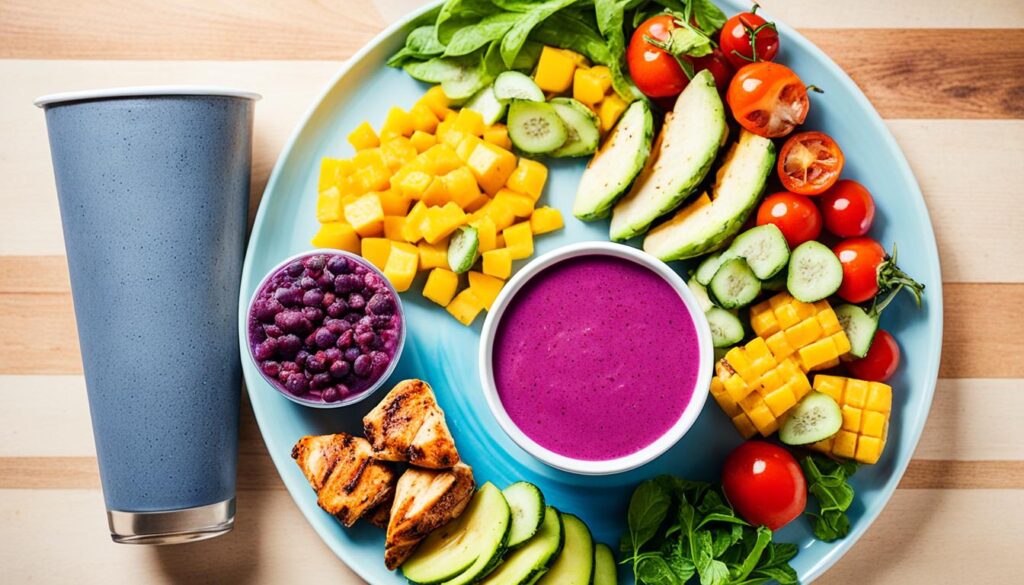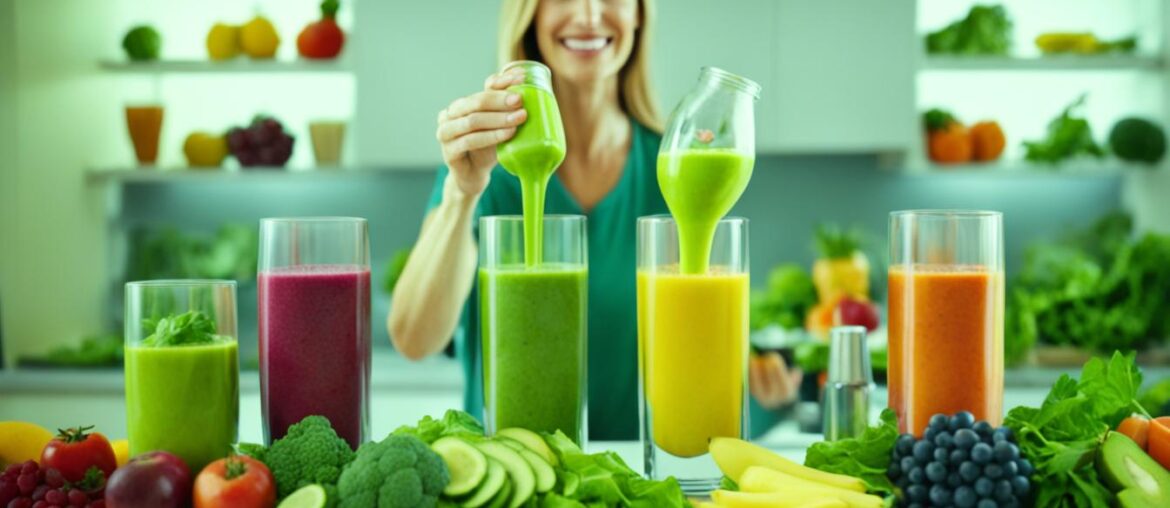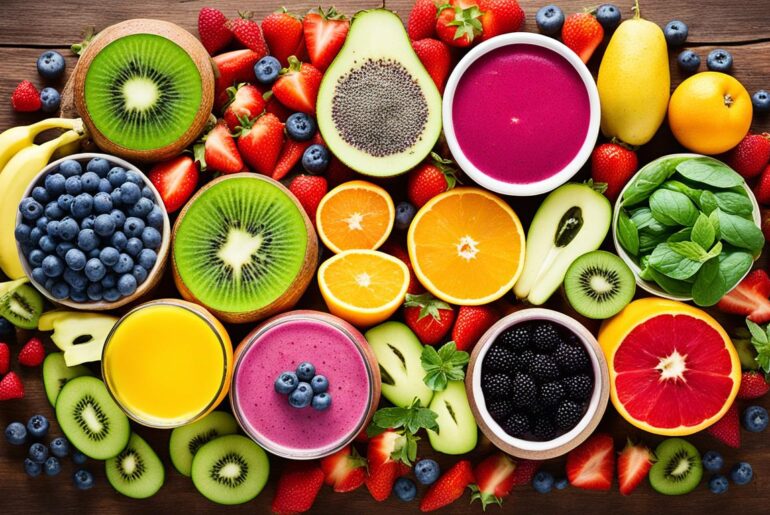The 21-Day Smoothie Diet aims to help you lose up to 9 pounds in just 3 weeks. It provides about 1,500 calories a day. This can naturally lead to losing weight for many. It seems almost too good to be true, doesn’t it? But there’s more to consider here.
This diet plan is seen as an easy fix for losing weight. It uses smoothies that are low in calories but high in nutrients and fiber. This helps you stay full longer and eat less. People say it makes them sleep better, have more energy, have better skin, and lose weight fast.
But, this diet has some downsides to think about. For example, the Green Detox smoothie has less than 4 grams of protein. This might affect how your muscles grow and repair. Also, eating too few calories can slow your metabolism. This can make you feel hungry, sick, have headaches, and be tired.
The diet is also high in sugar from fruits like bananas and strawberries. This might not be good for everyone. Especially for those with diabetes. While the diet is simple and the results come fast, its long-term effects are still unknown. This is because there’s no science to prove it’s good for your health in the long run.
Key Takeaways
- The 21-Day Smoothie Diet claims significant weight loss in a short period.
- Smoothies provide around 1,500 calories per day, which can aid in weight loss.
- The diet emphasizes low-calorie, high-fiber smoothies to keep you full.
- Potential risks include slowed metabolism, hunger, and fatigue due to low-calorie intake.
- High sugar content from certain fruits may not be suitable for individuals with diabetes.
- Long-term sustainability and health benefits are questionable without scientific evidence.
Introduction to The Smoothie Diet
Many people are wanting to live healthier lives nowadays. So, the smoothie diet for healthy weight loss is getting popular. This diet focuses on easy and nutrient-rich meals. It promises great weight loss results. Let’s explore the 21-Day Smoothie Diet, who started it, and what the creator claims.
Overview of the 21-Day Smoothie Diet
Drew Sgoutas, a health coach, created the 21-Day Smoothie Diet. It’s about swapping two daily meals with smoothies. These smoothies are low in calories but high in fiber. You also eat one solid meal and two snacks. The goal is to eat about 1,500 calories each day. Plus, there is one cheat day each week for eating whole foods.
Origins and Development
Drew Sgoutas made the 21-Day Smoothie Diet to make weight loss simple. The diet uses smoothies that are full of nutrients and easy to make. You can find his plan in an e-book titled “The Smoothie Diet” for $47. It has 36 smoothie recipes, meal ideas, shopping lists, and helpful tips. This plan helps you eat the right nutrients while cutting calories.
Main Claims of the Diet
The smoothie diet aims for quick weight loss, better immune function, and body detox. People say they lost 3-12 pounds in 21 days. Some even lost 9 pounds in just 3 days. But, there are debates. People discuss if it really works, if it is backed by science, and the risks like missing nutrients and too much sugar.
Nutritional Benefits of the Smoothie Diet
The Smoothie Diet focuses on fruits, vegetables, nuts, and seeds. It helps with weight loss and improves well-being.

High in Fiber
The Smoothie Diet is very rich in fiber. This comes from fruits and vegetables. Fiber helps with digestion and keeps blood sugar levels steady.
It also makes you feel full, helping control calories. Nuts and seeds add more benefits. This makes it easier to lose weight.
Rich in Vitamins and Minerals
Leafy greens and fruits like berries and bananas are used. They give a big vitamin and mineral boost. These include vitamins A, C, and K, plus folate and potassium.
This makes the smoothies very nutritious. They keep your body working well and your energy up.
Antioxidant Properties
The diet includes foods high in antioxidants. Blueberries, strawberries, and green tea extract are some. These help fight off stress in the body and protect it.
They help the immune system, make skin look great, and improve health. Drinking these smoothies supports your wellness goals.
The Smoothie Diet is well-planned for balanced nutrition and health benefits. It’s great for losing weight and getting healthier.
How The Smoothie Diet Helps with Weight Loss Efforts
The 21-Day Smoothie Diet is a great way for effective weight loss. It uses low-calorie, nutrient-rich recipes to help lower your daily calorie intake. With each smoothie having less than 375 calories and at least 6 grams of fiber, it supports quick weight loss.
This diet makes it easy to control calories without missing out on nutrients. It uses fresh fruits, 0% fat Greek yogurt, and unsweetened almond milk. These ingredients are not only nutritious but also low in sugar and taste sweet.
There’s a wide range of ingredients you can use in your smoothies. Options like bananas, cocoa, and Greek yogurt offer protein, fiber, and good fats. They’re key for staying healthy.
But, to lose weight with smoothies, you must pick ingredients wisely and watch your portions. Even though these smoothies are filling, they could lack protein and calories. This could affect muscle growth and metabolism. Also, fruit sugars might not be good for diabetics.
For those looking to lose weight with smoothies, it’s about more than just shedding pounds. It’s about a healthy mix of ingredients and keeping calorie intake low. This way helps with both short-term and long-lasting health goals.
| Calories | Fiber | Ingredients | Benefits |
|---|---|---|---|
| Less than 375 cal/smoothie | At least 6 grams/per serving | Bananas, Greek yogurt, nut butter, chia seeds, and more | Provides protein, fiber, vitamins, and minerals |
| ~1500 cal/day | Variety of fiber sources | Tofu, strawberries, spinach, lentils, etc. | Combined nutrient intake supports weight management |
Creating a Calorie Deficit with Smoothies
Creating a calorie deficit is a big part of the smoothie diet plan. This means eating fewer calories than your body burns. By doing this, you lose weight over time. The 21-Day Smoothie Diet helps by swapping high-calorie meals for low-calorie smoothies.

Understanding Calorie Balance
Understanding the balance between eaten and burned calories is important for weight loss. The smoothie diet gives you about 1,500 calories a day. This is less than what most adults use. Keeping up this deficit and staying active can help you lose weight. Some have lost up to 9 pounds in just three days.
Meal Replacement Strategy
Using smoothies to replace two meals daily can lower calorie intake. These smoothies are full of nutrients but have fewer calories. They should also have enough protein, fiber, and healthy fats. This will help you feel full and avoid side effects like hunger or tiredness. Adding things like 0 percent fat Greek yogurt, fruit, and unsweetened almond milk makes smoothies healthier.
While smoothies help in mindful eating, there’s more to losing weight. Things like regular exercise, balanced meals, good sleep, and managing stress matter too. Remember these to make your smoothie diet journey successful and healthy.
Best Smoothie Recipes for Weight Loss
Smoothies are a great way to lose weight. They mix fruits, vegetables, and protein-rich ingredients. This mixture creates a tasty blend of flavors and nutrients. It makes losing weight fun. Here are the three main kinds of smoothie recipes for slimming down.
Fruity Smoothies
Fruity smoothies are perfect for starting your day or as a sweet snack. They usually have berries, bananas, and other fruits. This makes them rich in vitamins and low in calories. They’re also full of fiber. This helps with digestion and stops you from eating too much. Try a berry-banana shake or a mango-pineapple mix.
Vegetable-Based Smoothies
Vegetable-based smoothies are perfect for adding greens to your diet. They often use spinach, kale, carrots, and beets. These ingredients are great for detox and are nutrient-rich. Blending veggies with fruits makes them yummier without losing their healthy benefits. Plus, they’re full of fiber to keep you full and help with weight loss.
High-Protein Smoothies
High-protein smoothies are key for building muscle and cutting hunger. They have Greek yogurt, nuts, seeds, and protein powder. Enjoy them after a workout or as a meal substitute. Try almond butter, spinach, and chia seeds for a mix of good stuff.
These 30 smoothie recipes are both tasty and healthy. Each one has less than 375 calories and at least 6 grams of fiber. They’re easy to make, taking about 5 minutes. They also have lots of omega-3s. They’re a big help in your weight loss plan.
Maintaining Fullness and Energy Levels
Keeping fullness and energy up with The Smoothie Diet depends much on fiber and protein. These nutrients play key roles in a successful smoothie diet and weight management.

Role of Fiber and Protein
Enough fiber in smoothies keeps you full longer. Leafy greens, whole fruits, and seeds add quality to your diet. They help in digestion and regulate blood sugar. Fiber is great for digestion and stops hunger by keeping you full.
Protein-rich smoothies help sustain energy and control hunger. Adding Greek yogurt, protein powder, or nuts builds muscle. It’s vital for weight loss.
Sustained Energy Release
A balanced smoothie has carbs, proteins, and fats for all-day energy. The Smoothie Diet focuses on this balance. It supports fullness and steady energy levels. This mix is key for metabolism and energy without crashes.
Using high-quality ingredients boosts nutrient absorption. This lets your body use the vitamins well. With nutrient-rich ingredients, you make smoothies full of fiber and protein. They help meet your weight goals.
| Ingredient | Fiber Content | Protein Content | Benefit |
|---|---|---|---|
| Leafy Greens | 3g per cup | 1g per cup | Enhanced digestion, low-calorie |
| Greek Yogurt | 0g | 10g per 100g | Muscle repair, sustained energy |
| Chia Seeds | 10g per ounce | 4g per ounce | Extended fullness, nutrient-dense |
| Almonds | 4g per ounce | 6g per ounce | Sustained energy, healthy fats |
| Blueberries | 3.6g per cup | 1.1g per cup | Antioxidants, blood sugar regulation |
Adopting a balanced approach with fiber in smoothies and protein-rich smoothies keeps you full. You maintain energy and manage weight. It leaves you feeling energized and happy all day.
Detox Benefits and Improved Digestion
Starting a smoothie diet detox has many pluses, like cleansing and better digestion. Using natural, fiber-loaded foods helps remove toxins. It also boosts gut health with smoothies.
Gut Health Improvements
The Smoothie Diet enhances gut health with whole, natural ingredients. These nutrients and fibers promote a healthy gut. Fruits, veggies, and seeds boost digestion and nutrient absorption.
Elimination of Processed Foods
Cutting out processed foods is key to this diet’s detox. Avoiding bad sugars, additives, and fats helps the body cleanse. This leads to better skin, more energy, and better health.
Following the 21-Day Smoothie Diet could lead to losing up to 9 pounds quickly. It limits calories to about 1,500 a day for weight loss. But, eating too few calories might slow your metabolism. It could also cause hunger, nausea, headaches, and tiredness.

Research shows some drawbacks too. Smoothies may not fill you up like solid food, causing more hunger. For instance, the Green Detox smoothie has less than 4 grams of protein. This could affect muscles and immunity.
The smoothie diet quickly helps detox the body. But it’s vital to keep your nutrient intake balanced. High fiber in smoothies is great for gut health. Yet, the high sugar and tough weight loss goals need careful thought.
| Detox Benefits | Improved Digestion |
|---|---|
| Excludes processed foods | High fiber intake |
| May lead to clearer skin | Supports healthy gut microbiome |
| Boosts energy levels | Facilitates nutrient absorption |
Achieving Long-Term Weight Loss Goals
To succeed over time, focus on habits you can keep up. The smoothie diet helps in losing weight by providing nutrition and controlling calories. It’s important to make changes in your life that the smoothie diet encourages for better health.

Adapting to a Healthier Lifestyle
Adding healthy habits is crucial with the smoothie diet for weight loss. It matters to know how calories work. Safe weight loss is about losing 1-2 pounds each week. You can do this by having smoothies instead of high-calorie meals. The diet keeps you healthy by cutting calories and giving you a lot of fiber.
Repetition and Consistency
Being consistent is key to success. Having smoothies often as meal swaps helps cut calories but keeps nutrients you need. Try to get at least 150 minutes of activity each week. Also, do strength exercises two days or more. Think about your age, gender, weight, how active you are, and your goals to make the diet work for you.
| Goals | Recommendations |
|---|---|
| Weight Loss | 1-2 pounds per week |
| Exercise | 150 minutes of moderate-intensity aerobic activity weekly |
With the smoothie diet’s lifestyle changes, big weight loss goals can be met. Also, great health benefits come along. It’s normal to face challenges, but keep going. Staying on track will get you to success.
The Role of Solid Meals in the Smoothie Diet
Solid meals are just as important as smoothies in The Smoothie Diet. They make sure you get balanced nutrition and stay healthy. Solid food and smoothies work together for a healthy diet plan.

Choosing Healthy Whole Foods
It’s key to pick whole foods for your other meals. Foods like lean proteins, whole grains, and veggies are good. They balance your diet with the smoothies, giving all nutrients your body needs.
Balancing Nutrient Intake
To balance your diet, mix smoothies and solid meals smartly. Say, smoothies give you vitamins and fiber. But, solid meals give you proteins and healthy fats not in smoothies. This mix makes your diet complete, promoting long-term health.
Foods to Avoid on The Smoothie Diet
The 21-Day Smoothie Diet helps you lose weight by using healthy ingredients. It’s important to avoid some foods though. These can slow down your progress in losing weight.
High-Sugar Foods
High-sugar foods are a no-go. This includes sugary drinks, candies, and flavored yogurts. Eating too much sugar can mess with your calorie goals. It can also make your blood sugar levels jump, making you feel tired.
Processed Foods
You should also cut out processed food. This means saying no to processed meats, refined grains, and fried foods. These foods have bad fats and additives.
They don’t fit with the smoothie diet’s healthy goals. Stick to whole foods like fruits, veggies, and proteins. Think of things like natural almond butter and lentils.
Following these food rules helps with losing weight. It also boosts your health. This is because you avoid bad sugar. And you make sure you eat plenty of nutrients.
Potential Downsides and Considerations
The Smoothie Diet has benefits, but it’s also key to know the possible risks with the smoothie diet. One main issue is it might not give all the nutrients you need. For example, the Green Detox smoothie has less than 4 grams of protein. This might not be enough protein for an adult each day.
Also, having about 1,500 calories a day could help you lose weight, but it’s not easy. This low calorie amount could make your metabolism slow down. It might also make you feel hungry, nauseous, get headaches, and feel tired. The diet’s sweet fruits and added things like honey or granola add to the challenge.
Another critical view of the smoothie diet is the lack of research proving its benefits. While some say it improves skin, gut health, and immunity, these claims lack evidence. Rapid weight loss claims exist – up to 9 pounds in 3 days. But keeping that weight off might not work. The diet’s low protein and nutrients might lead to not getting enough vitamins and minerals.
Lastly, sticking to a very strict diet can be hard. Critics say quick weight loss might happen at first. But you might gain the weight back once you eat normally again.
| Concerns | Impact |
|---|---|
| Low Protein Content | Insufficient for Daily Needs |
| Low Calorie Intake | May Slow Metabolism |
| High Sugar Content | Potential for Increased Sugar Intake |
| Lack of Nutrients | Risk of Deficiencies |
| Restrictive Nature | Sustainability Issues |
| Lack of Scientific Support | Questionable Long-Term Benefits |
Tips for Success on The Smoothie Diet
Starting The Smoothie Diet takes careful planning and strong motivation. Use strategic meal planning and keep motivated to boost your success. This will help you stick with the smoothie diet.
Meal Planning and Preparation
Strategic meal planning is key to succeeding with the smoothie diet. Start with a detailed shopping list for smoothies, snacks, and meals. Prepping ingredients ahead saves time, making smoothies easy to prepare.
Having a meal plan helps stick to 1,500 calories a day. It lowers the risk of extra snacking or straying from your diet.
Staying Motivated
Keeping up motivation can be hard, but it’s vital for long-term success. Set clear goals, and track your progress to stay focused. Use supportive communities, like forums or groups, for motivation and accountability.
Celebrate your achievements to stay motivated. This encourages you to stick with your smoothie diet plan.
Comparing The Smoothie Diet with Other Diets
When we look at weight loss diets, the 21-Day Smoothie Diet stands out. It has both differences and similarities to other diets. Understanding these can help you choose the right diet for your health goals.
Differences and Similarities
The 21-Day Smoothie Diet involves replacing two meals a day with smoothies. These smoothies are packed with fruits, veggies, and whole foods. They cut down on processed foods, sugar, and fried foods. This approach is different from diets that limit carbs or eating times.
Like other meal-replacement plans, the Smoothie Diet focuses on eating fewer calories. However, it might provide fewer calories daily than diets recommended by the USDA.
| Diet Type | Daily Calorie Intake | Primary Ingredients | Replacement Meals |
|---|---|---|---|
| Smoothie Diet | 1,500 | Fruits, Vegetables, Nuts, Seeds | Two Smoothies |
| Slimfast | 1,200-1,500 | Meal Bars, Shakes | Two Shakes |
| Keto | Varies | High Fat, Low Carb | None |
Pros and Cons
Let’s look at the good and bad of the smoothie diet.
- Benefits: The smoothie diet boosts your intake of nutritious, fiber-rich foods and is easy to follow. It can lead to quick weight loss because you eat fewer calories and feel fuller.
- Drawbacks: Liquids might not keep you as full as solid food, making you hungry. The diet might also miss essential nutrients, like protein. This could cause nutrient shortages and weight gain later.
It’s key to consider the smoothie diet alongside other diets for balance and lasting health. Knowing what sets it apart can help you make a smart choice for your lifestyle and health.
Conclusion
The Smoothie Diet offers a special way to lose weight. It does so by having you eat fewer calories through smoothies. Most people lose 1-2 pounds every week on this diet.
This diet is rich in important nutrients. These include fiber, vitamins, and antioxidants. Fiber helps you feel full, controls blood sugar, and stops you from eating too much. Ingredients like green tea and ginger boost metabolism. This helps burn more calories and fat.
For long-term success, you need more than just smoothies. Eat balanced meals and exercise regularly. A mix of 150 minutes of moderate or 75 minutes of intense exercise every week is good. Making healthy lifestyle choices is also key.
Now, there are smoothie delivery services that make it easy. Brands like Shake Please, Daily Harvest, and Splendid Spoon provide convenient, healthy smoothies. They make meeting your diet goals easier.
Even though the Smoothie Diet is a good way to lose weight, it’s important to see it as part of a bigger picture. Consider your own dietary needs, the importance of a sustainable approach, and the role of regular exercise. All these elements together can improve the diet’s success and your health over time.




